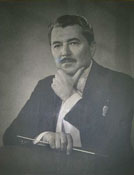Leo Arnaud facts for kids
Quick facts for kids
Leo Arnaud
|
|
|---|---|
 |
|
| Background information | |
| Birth name | Noël Leon Marius Arnaud |
| Also known as | Leo Vauchant |
| Born | July 24, 1904 Lyon, France |
| Died | April 26, 1991 (aged 86) Hamptonville, North Carolina, United States |
| Genres | Film scores |
| Occupation(s) | Arranger, composer, and orchestrator |
| Instruments | Cello and trombone |
| Years active | 1930s–1960s |
Leo Arnaud (born Noël Leon Marius Arnaud) was a talented French-American musician. He was born in Lyon, France, on July 24, 1904. He became famous as an arranger, composer, and orchestrator for movies.
Arnaud is best known for composing "Bugler's Dream." This piece of music is used as the main theme for the Olympic Games broadcasts in the United States. He passed away on April 26, 1991, in Hamptonville, North Carolina.
Contents
Early Life and Career
Leo Arnaud studied music composition in France. He went to conservatories in Lyon and Paris. There, he learned from famous composers like Maurice Ravel.
Before moving to the United States, Arnaud played jazz trombone. He used the name Leo Vauchant during this time. He also arranged music for a band in England from 1928 to 1930.
In 1931, Arnaud moved to the United States. He started working in Hollywood. He arranged music for Fred Waring, a popular bandleader. From 1936 to 1966, he worked for Metro-Goldwyn-Mayer (MGM). At MGM, he was an arranger, composer, and orchestrator for many films.
After his long career in Hollywood, Arnaud retired. In 1980, he moved to Yadkin County, North Carolina. His wife, Faye Brooks Arnaud, was from that area. He is buried in Hamptonville, North Carolina.
Bugler's Dream: The Olympic Theme
"Bugler's Dream" is a very famous piece of music. In the United States, it is known as the theme for the Olympic Games. Television networks like ABC and NBC have used it. They started using it for the 1964 Summer Olympics in Tokyo. Many people consider it an Olympic symbol.
The Music of "Bugler's Dream"
Arnaud's piece sounds very grand and important. It starts with a strong drum beat from a timpani. Then, a clear and special tune is played by brass instruments. This makes the music sound powerful and exciting.
The main tune of "Bugler's Dream" comes from an older piece. It is based on "Salut aux étendards" by Joseph-David Buhl. This was a typical trumpet call used by cavalry during Napoleon's time in France.
How it Became the Olympic Theme
In 1958, a conductor named Felix Slatkin asked Arnaud to create a piece of music. Arnaud wrote "The Charge Suite" for Slatkin's album Charge!. "Bugler's Dream" was part of this suite.
ABC began using "Bugler's Dream" as their Olympic theme. They first used it for the 1964 Winter Olympics in Innsbruck, Austria. It was also used for the TV show ABC's Wide World of Sports.
Later, NBC also started using the theme. They brought "Bugler's Dream" back for the 1992 Summer Olympics in Barcelona, Spain.
Combining with John Williams' Music
For the 1996 Summer Olympics in Atlanta, Georgia, "Bugler's Dream" was combined with another famous Olympic song. This was John Williams' "Olympic Fanfare and Theme."
The Boston Pops Orchestra played this combined version. Williams arranged "Bugler's Dream" to be similar to Arnaud's original. But he added a full orchestra for a powerful repeat of the tune. This combined piece has been used in many Olympic broadcasts since, including the 2010 Winter Olympics closing ceremony.
Film Work
Leo Arnaud worked on many movies during his career. He was an orchestrator, arranger, and sometimes a composer. He helped create the music for films like The Wizard of Oz (1939) and Seven Brides for Seven Brothers (1954). His work helped bring the musical magic to many classic Hollywood films.
Awards and Recognition
In 1965, Leo Arnaud was nominated for an Academy Award for Best Original Score. This was for his work on the movie The Unsinkable Molly Brown (1964). He was nominated along with six other musicians who worked on the film's music. Arnaud was recognized for his important role in orchestrating the score.
 | Roy Wilkins |
 | John Lewis |
 | Linda Carol Brown |

